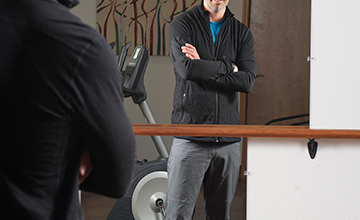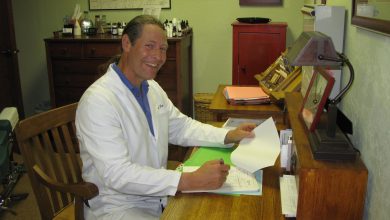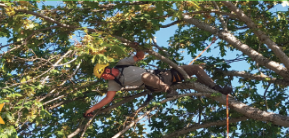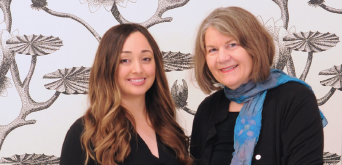Gary Einhorn – Business Advisor & Mentor
 I had an immediate sense of curiosity when I started speaking to Business Advisor Gary Einhorn. He told me about his life, his work, and his current passion of giving back to the community in service by helping small to medium size business owners succeed. He himself has successfully created, owned, and managed five businesses and sold two over a period of thirty years as an entrepreneur. However, what captivated my interest the most was Gary’s frank and articulate portrayal of being an entrepreneur. At first I wondered if I was hearing his inner “New Yorker”(tell it as it is take on life), but as I continued to listen, I found myself nodding my head and thinking. This guy not only understands what he is talking about, but he has his own experiences to back it up.
I had an immediate sense of curiosity when I started speaking to Business Advisor Gary Einhorn. He told me about his life, his work, and his current passion of giving back to the community in service by helping small to medium size business owners succeed. He himself has successfully created, owned, and managed five businesses and sold two over a period of thirty years as an entrepreneur. However, what captivated my interest the most was Gary’s frank and articulate portrayal of being an entrepreneur. At first I wondered if I was hearing his inner “New Yorker”(tell it as it is take on life), but as I continued to listen, I found myself nodding my head and thinking. This guy not only understands what he is talking about, but he has his own experiences to back it up.
Sure, one can go to school and study business or finance, but when it comes to actual implementation, very few people have the real life experience to pull it off. If you work as an employee for a company this is not as much of a concern because you can always find a new job if the business fails. But when you are putting your own livelihood and reputation on the line, you really need the advice, experience, and guidance of professionals. I thought it would be fun for you to learn a little bit more about Gary, his life, and accomplishments. You may then decide for yourself if he might be the one you would like to work with or refer to a friend who is deep in the trenches of running his or her own business.
Gary, thanks for talking with us today. Let’s start with some background. You were fortunate to have been a part of a family of entrepreneurs. Can you share with us how growing up in this type of environment helped you?
My father was born in Czechoslovakia and came to this country when he was five. He left High School at age 14 to work in his father’s grocery store full time and became an entrepreneur for the rest of his life. When my Dad took me with him on Saturdays to visit his supermarkets in New York I noticed how persistent and fearless he was. I learned the value of service and how important it is to treat your employees, customers, and vendors well. He understood the principle of ethical conduct and modeled this for me. He would often remind me that one needed to be tenderhearted but tough minded. He taught the importance of relationship building and how to develop and earn trust.
Your father and his four brothers founded and created one of the first super market chains in the United States. At their peak, they had 22 stores. Though your father became wealthy, he never gave you handouts. Will you talk about this?
My father instilled a strong work ethic in me. If I wanted something, I had to work for it. I had to work for my allowance and that built the foundation for my own entrepreneurial life. I remember wanting a Raleigh English Racing bike when I was a teenager. I worked all summer to earn the money and bought the bike. When I turned eighteen, my father presented me with a bankbook with the exact amount of money I had paid for my bike. Lesson learned!
At a very young age you and your best High School friend had your own business shoveling driveways and sidewalks in Belle Harbor, Queens, New York. What was this like for you?
This was my first business. Whenever it snowed in New York and the schools were closed, my best friend Steven Nichols and I cleaned people’s driveways and sidewalks. We formed a partnership with a handshake. Many of my father’s agreements were made that way, back in the 1940’s and 1950’s. If you trust others, he would say, they will be trustworthy. I also had my own lawn and plant watering business in the summer after the school year ended. From these two businesses I began to learn about how to be an entrepreneur.
You graduated from college in 1964 with a B.S. in Business Administration, a major in Economics and a minor in Philosophy. After college, you went to work for your cousin who was the U.S. and Canadian representative for a West German manufacturer of knitting machinery. You told me that you were in the right place at the right time to launch your next business, Davalan fabrics in West New York, New Jersey. What was that business and how did you know you had the right timing for it.?
We produced knitted fabric for sale to garment manufacturers throughout the United States. I knew the timing was right because knitted fabrics were a developing niche in the U.S. Intuitively knowing what type of business to start and when became a theme throughout my entrepreneurial life.
This sounds like an interesting time for you.
Indeed! I was only in my late 20’s and had invested every penny I had in this venture. I realized early on that to be an entrepreneur meant to be a risk taker. As a “prudent” risk taker, I discovered the idea of “high risk – high reward” and the delicate balance in “risk management.” This is what is meant by experiential entrepreneurial learning.
You then sold your interest in the successful Davalan Fabrics company and became involved in your first food business venture, “Hot and Cold,” followed by two incarnations of Beardsley’s Natural Foods, one in Upper Nyack, New York followed by another here in Ashland, Oregon.
That happened through my work at an indoor tennis club as a tennis teaching professional where I met a man who was looking for a partner to start a business selling hot pretzels and Italian Ice. We named it Hot and Cold and had five stands. I managed all aspects of the business and soon realized and truly believed that I had what it took to be successful at anything I put my mind to. I learned a template for entrepreneurial success.
We were very successful but lost our lease after three years. That led to my first incarnation of Beardsley’s Natural Foods in 1985. It was a wholesale distributorship of organic, natural, and specialty foods. I sold it in 1988, moved here to Ashland and started the west coast version of Beardsley’s. I sold it in 2006 and it continues to thrive as Oregon Artisan Foods owned by Dave and Laurie Westerberg.
When you first arrived in Ashland, a few of the vendors doubted your ability to create the West Coast edition of this business. What were some of the obstacles you had to work through and changes you implemented?
Oregon was in a recession when I came here in 1988 and the interest in natural foods was in its infancy, compared to the East Coast. I had to convince local vendors in the Rogue Valley that they needed to focus on production and leave the marketing and distribution to me. I also had to convince them that distribution is a cost, not a profit item if they chose to distribute themselves. They were dubious at first because they hadn’t seen anyone be successful at this before. That was exactly the motivation I needed! When Rising Sun Farms agreed to have me as their local distributor, others began to follow.
In your experience what are the most difficult challenges facing small business owners today?
This is the worst recession since the 1930’s. Small to medium size business owners are facing an economic climate that is challenging, to say the least, and they simply can’t afford to make costly mistakes, particularly in an area like Southern Oregon where marketing and adequate capitalization are difficult to secure. These are significant challenges for entrepreneurs, which is why it is essential to get help. Business coaching is not an option in this economic climate; it’s what gives small business owners the survivor’s edge.
I’ve heard you say that “Small is Beautiful.” Say more about this philosophy and why you decided to concentrate a majority of your efforts on helping small to medium size businesses.
I focus on managing my businesses while maintaining as much personal contact with people as possible and I have always chosen to support the underdog/underprivileged because this is the segment of our population that has the greatest need. This is the market I wish to serve.
Confidence plays a big role in enabling business owners to take risks. How has your own confidence grown and changed with each new venture you took on?
Success breeds success. While teaching tennis, I noticed how my students’ confidence grew with every small successful step they took. In my case, my confidence grew as I experienced one successful business after another. I never expected to fail. I discovered that it is part of my DNA to anticipate and attract whatever I need for success. What’s essential to understand is that entrepreneurship is a trial by fire. One has to risk and understand that even failure is a potential opportunity to grow.
What is the best business advice you were given and what did you do with it?
I have always relied on mentors. One of them told me that you build your business “knish by knish.” He made tofu knishes and I became his Mid Hudson Valley distributor. Every sale is important, he told me. He also inspired me with words spoken by Winston Churchill during World War Two: “Never, never, never, never, give up.” I learned that persistence, tenacity, and perseverance against all odds is a prerequisite for entrepreneurial success. And, that mentors are vital.
When business owners are facing challenges they often turn to their friends or spouses for advice. What would you say about this?
Advice from friends and spouses is important but they are often not successful entrepreneurs themselves. That’s why it is essential to also consult with a qualified business coach who has “been there and done that.” He or she has experienced the trials of running a successful business and there is simply no substitute for that. Also, they have a team with them. In my case, having lived in the Rogue Valley for almost 25 years, I have acquired many personal contacts, relationships, and resources and these are all available to my clients.
What is the number one mistake you see business owners repeating time and time again?
Many business owners work hard IN their business, but not enough ON their business. To successfully develop your business, planning and promotion are essential but this is what is often neglected. Owners may have the technical skills, but not the entrepreneurial skills. If they want to be more than an employee and succeed as a business owner, they have to learn those skills so that’s how I educate my clients. I also stress the importance of presentation skills and self-promotion. As a past President and Area Governor of University Toastmasters in Ashland, I advocate using Toastmasters to practice presenting in front of a live audience to build leadership skills and self confidence.
Can you give a recent success story you have had with a client?
I had many during my six years of business consulting in the Valley. One client has grown his business substantially – even in these challenging times – simply by taking well researched, sensible risks and following his intuition. That’s a winning formula for every entrepreneur.
Finally, what sort of business person are you currently interested in assisting?
I’m looking for those who are willing to apply themselves, rather than someone looking for a magical miracle. This means doing their homework (I give homework and action items to be followed). I want my clients to succeed by holding themselves accountable, people who don’t blame the economy or competitors for their failures.
Clients often come to me for confirmation, analysis of the viability of their ideas and actions, empowerment, and to discuss the pros and cons of their pending business decisions. I listen with an untainted, nonjudgmental ear, and offer simple and novel ideas to contemplate. I will intercede if I perceive red flags but prefer my clients to come to their own conclusions. I serve as a guide on their journey to entrepreneurial success.
Any last comments for our readers?
My strong intuitive and analytical skills often enable me to see things business owners do not see for themselves. For instance, I may focus on some aspect of a client’s personal life because if that is not in order they will have difficulty with their business. My intention is to help them become successful in business and happy in life.
Gary Einhorn can be reached at 541-292-6177 or by e-mail at garyae@gmail.com. He hosts a radio show on KSKQ 89.5 FM Community Radio called “Your Entrepreneurial Ear” which airs on the first Tuesday of every month from 9:30-10:00 A.M. On October 10th from 10:00-11:30, he will be presenting “Plan, Promote, Protect: How to Grow Your Business in These Economic Times” at Bingham Knoll in Jacksonville with Excalibur Computing Solutions and Rogue Valley IMC. The presentation is open to all Rogue Valley Business owners free of charge.




